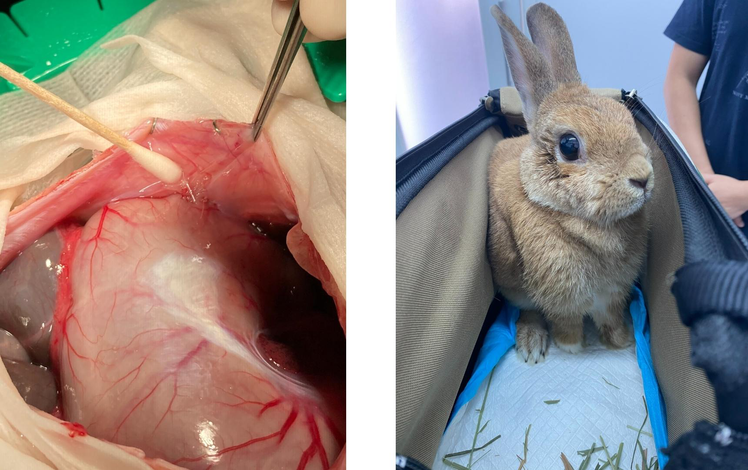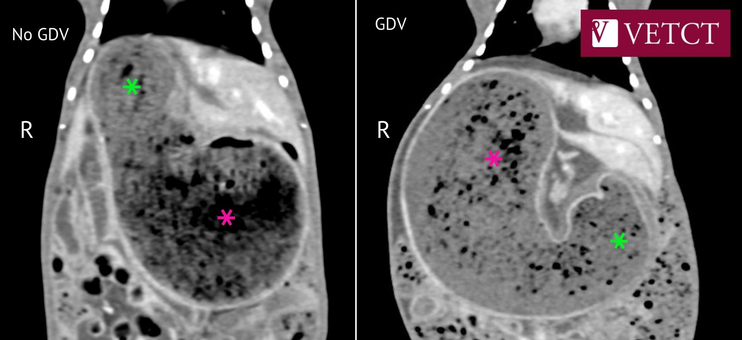VetCT and Exotics Vet Support are raising awareness about the potential for delayed or mis-diagnosis of acute surgical abdominal conditions in rabbits, such as gastric dilation and volvulus (GDV). Use of CT is encouraged for rapid diagnosis to direct early, targeted surgical intervention and improve outcomes.
Case Study
Gastric dilation is a common condition in rabbits, however incidence of GDV is poorly documented. Dr Dean Felkler, Founder and CEO of Exotic Vet Support and senior clinician at Tai Wai Small Animal and Exotic Hospital, highlighted the importance of accurate and early diagnosis in a recent case of a 7yr old rabbit that was presented for anorexia and hadn’t passed faeces for over 12hrs. Dr Dean says, “A full diagnostic investigation was performed. From the radiographs it is difficult to appreciate the GDV. However, on the CT scan reported by VetCT, it was very obvious when compared to the normal stomach orientation.”
After initial stabilisation, the patient underwent surgery to re-orientate the stomach and an incisional gastropexy was performed. Following surgery, the rabbit recovered well and was eating and passing faeces within 24 hours.

Left: Intra-operative image during surgery to correct the GDV. Right: ‘Ball Ball’ the rabbit recovered well post-surgery
CT Important in Diagnostics
Use of CT is increasingly recognised as vital for early, accurate diagnosis of pathology in rabbits, including conditions such as GDV, appendicitis and rhinitis. Providing specialist teleradiology and teleconsulting services to veterinary teams, such as the Tai Wai Hospital, VetCT increases access to advanced imaging and expert advice for patients in the clinic.

VetCT report of a CT scan showing GDV in a rabbit - The pylorus (lime green stars) denoted by the thick pyloric wall is located on the left side of the abdomen and the fundus (dark pink stars) is right laterally located.
Dr David Reese, Director of VetCT Australia and exotics expert explains, “We are able to identify several life-threatening pathologies much more accurately with CT than radiographs. This is vital for early correction of acute surgical abdominal conditions to increase the likelihood of a positive outcome.”
VetCT offers rapid teleradiology turnaround times around the clock, including detailed CT reports. The company is encouraging veterinary teams to reimagine imaging for their practice, increasing the accessibility of advanced modalities with remote radiologists to report on images, improving diagnostic accuracy, confidence and peace of mind.
To trial the service for free, visit our registration page here.
VET.CT Champions Radiation Safety through Global Campaign
VET.CT has launched a campaign to raise awareness about the importance of radiation safety in veterinary practice, providing a comprehensive suite of free resources and real-life case studies to support veterinary teams.
Read morePennard Vets Radiation Safety Case Study
How do real-life practices keep their teams and patients safe during diagnostic imaging? VET.CT sat down with leading clinics to uncover practical, everyday tips that make radiation safety simple and effective.
Read moreQueensland Veterinary Specialists Radiation Safety Case Study
How do real-life practices keep their teams and patients safe during diagnostic imaging? VET.CT sat down with leading clinics to uncover practical, everyday tips that make radiation safety simple and effective.
Read more